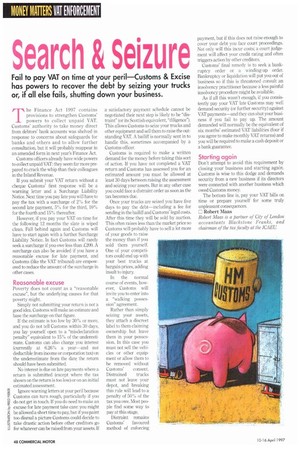Search & Seizur
Page 50

If you've noticed an error in this article please click here to report it so we can fix it.
The Finance Act 1997 contains provisions to strengthen Customs' powers to collect unpaid VAT. Customs' authority to take money direct from debtors' bank accounts was shelved in response to concerns about safeguards for banks and others and to allow further consultation, but it will probably reappear in an amended form in next year's Finance Act.
Customs officers already have wide powers to collect unpaid VAT: they seem far more prepared to crack the whip than their colleagues in the Inland Revenue.
If you submit your VAT return without a cheque Customs' first response will be a warning letter and a Surcharge Liability Notice. Next time you pay late you will have to pay the tax with a surcharge of 2% for the second late payment, 5% for the third, 10% for the fourth and 15% thereafter.
However, if you pay your VAT on time for the following 12 months the slate is wiped clean. Fall behind again and Customs will have to start again with a further Surcharge Liability Notice. In fact Customs will rarely seek a surcharge if you owe less than £200. A surcharge can also be avoided if you have a reasonable excuse for late payment, and Customs (like the VAT tribunal) are empowered to reduce the amount of the surcharge in other cases.
Reasonable excuse
Poverty does not count as a "reasonable excuse", but the underlying causes for that poverty might.
Simply not submitting your return is not a good idea. Customs will make an estimate and base the surcharge on that figure.
If the estimate is too low by 30% or more, and you do not tell Customs within 30 days, you lay yourself open to a "misdeclaration penalty" equivalent to 15% of the underestimate. Customs can also charge you interest (currently at 626% a year—and not deductible from income or corporation tax) on the underestimate from the date the return should have been submitted.
No interest is due on late payments where a return is submitted (except where the tax shown on the return is too low) or on an initial estimated assessment.
Ignore warning letters at your peril because Customs can turn rough, particularly if you do not get in touch. If you do need to make an excuse for late payment take care; you might be allowed a short time to pay, but if you paint too dismal a picture Customs could decide to take drastic action before other 0-editors go for whatever can be raised from your assets. If
a satisfactory payment schedule cannot be negotiated their next step is likely to be "distraint" (or its Scottish equivalent, "diligence"). This allows Customs to seize your trucks and other equipment and sell them to raise the outstanding VAT A bailiff is normally sent in to handle this, sometimes accompanied by a Customs officer.
Customs is required to make a written demand for the money before taking this sort of action. If you have not completed a VAT return and Customs has assessed you for an estimated amount you must, be allowed at least 30 days between raising the assessment and seizing your assets. But in any other case you could face a distraint order as soon as the tax becomes due.
Once your trucks are seized you have five days to pay the debt—including a fee for sending in the bailiff and Customs' legal costs. After this time they will be sold by auction. This often raises less than the market price so Customs will probably have to sell a lot more of your goods to raise the money than if you sold them yourself. One of your competitors could end up with your best trucks at bargain prices, adding insult to injury.
In the normal course of events, however. Customs will invite you to enter into a "walking possession" agreement.
Rather than simply seizing your assets, they attach a discreet label to them claiming ownership but leave them in your possession. In this case you must not sell the vehicles or other equipment or allow them to be removed without
Customs' consent.
Distrained trucks must not leave your depot, and breaking this rule will lead to a penalty of 50% of the tax you owe. Most people find some way to pay at this stage.
Distraint remains Customs' favoured method of enforcing payment, but if this does not raise enough to cover your debt you face court proceedings. Not only will this incur costs; a court judgement will affect your credit rating and often triggers action by other creditors.
Customs' final remedy is to seek a bankruptcy order or a winding-up order. Bankruptcy or liquidation will put you out of business so if this is threatened consult an insolvency practitioner because a less painful insolvency procedure might be available.
As if all this wasn't enough, if you consistently pay your VAT late Customs may well demand security (or further security) against VAT payments—and they can shut your business if you fail to pay up. The amount demanded will normally be the equivalent of six months' estimated VAT liabilities (four if you agree to make monthly VAT returns) and you will be required to make a cash deposit or a bank guarantee.
Starting again
Don't attempt to avoid this requirement by closing your business and starting again. Customs is wise to this dodge and demands security from a new business if its directors were connected with another business which owed Customs money.
The bottom line is, pay your VAT bills on time or prepare yourself for some truly unpleasant consequence&
I: Robert Maas Robert Maas is a partner of City of London accountants Blackstone Franks, and chairman of the tax faculty at the ICAEU












































































































